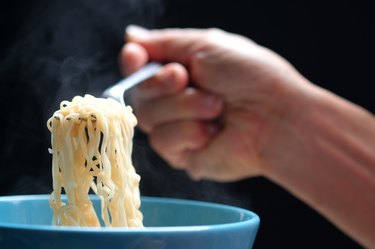
When you're indulging in ramen noodles — whether it's a big bowl packed with meat and vegetables at a restaurant, or instant ramen at home — you may be aware of the dish's high levels of calories, sodium and fat. But you can prepare ramen without the seasoning packet and get a healthier result.
Calories in Ramen Noodles
Video of the Day
You might think that cooking up some instant ramen without the seasoning packet may be healthier for you than the whole package. It turns out, however, that even plain instant ramen noodles sodium levels are quite high. And most of the calories in ramen noodles, in fact, come from carbohydrates and fat.
Video of the Day
According to My Food Data, one packet of ramen (without the seasoning packet) contains about 356 calories, half of which are from carbohydrates and 36 percent of which are from fat. This packet contains more than 14 grams of fat and 6 grams of saturated fats.
While it does contain 8 grams of protein and some iron, it has more than 1,500 milligrams of sodium — which is 65 percent of your daily value. MedlinePlus recommends consuming no more than 2,300 milligrams of sodium per day.
These dried noodles are often made from refined white flour, palm oil and salt. The flavor packets that go along with them, meanwhile, are packed with even more sodium, different seasonings and sometimes monosodium glutamate (MSG). All of these ingredients are very low in nutrition, making ramen noodles an empty-calorie dish.
Ramen Noodles and Your Health
Despite their popularity and tastiness, highly processed ramen noodles can be detrimental to your health. According to the University of Southern California (USC), research has shown that ramen may increase the risk of metabolic syndrome in women due to the high level of processed ingredients, sodium and saturated fats.
Consuming these unhealthy calories in ramen noodles could contribute to things like high blood pressure and other cardiovascular issues, especially over the long term. A June 2017 study published in Nutrition Research and Practice found that frequent consumption of instant ramen noodles increased cardiometabolic risk factors among young, healthy college students in Seoul. Some of those risk factors included plasma triglyceride levels, diastolic blood pressure and fasting blood glucose levels.
In addition, instant ramen noodles sodium levels can be harmful to health. According to MedlinePlus, too much sodium in your diet can lead to high blood pressure and may cause a buildup of fluid in people who have heart disease, cirrhosis of the liver or kidney disease. In short, you'll want to eat instant ramen noodles in moderation and find some alternative healthier recipes to try.
Healthy Ramen Recipes
While you may experience cravings for instant ramen or restaurant ramen, you can always make healthier recipes at home. You can reduce the calories in ramen noodles by avoiding common ramen ingredients high in fat, like pork belly. You can also try brown rice ramen noodles, for example, instead of refined white flour noodles, for more fiber.
Next, reduce your ramen noodles sodium levels by ditching the flavor packets that come with instant ramen, or choose the low-sodium versions. Ramen without the seasoning packet will be free of MSG or other questionable preservatives. You can make your own broth at home, and fill it with herbs and spices without all the extra salt or preservatives. To make your own broth, you can mix miso paste with soy sauce then combine it with delicious additions like garlic, ginger, chili oil and spices.
Finally, make your bowl of ramen more nutrient-dense by packing in vegetables. Bok choy, broccoli, kale, mushrooms and carrots are all great choices of vegetables for ramen soup that contain high levels of vitamins. Broccoli, for example, has a lot of fiber, calcium, potassium, magnesium and zinc.
Lastly, make your bowl of ramen a properly filling meal and add some protein. Plant-based proteins, like tofu, are excellent and healthy additions to noodle dishes. You can also add lean meats, like chicken, or a soft-boiled egg on top.
- MyFoodData.com: "Nutrition Facts for Soup Ramen Noodle Chicken Flavor Dry"
- MedlinePlus: "Sodium in Diet"
- University of Southern California (USC): "Is Your Ramen Ruining Your Health?"
- Nutrition Research and Practice: "Instant Noodle Consumption Is Associated With Cardiometabolic Risk Factors Among College Students in Seoul"
- MyFoodData.com: "Nutrition Facts for Broccoli (Cooked)"